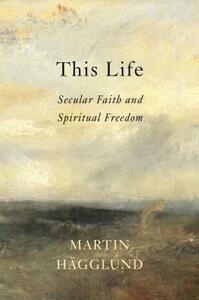Take a photo of a barcode or cover
Good philosophy but didn’t need so many examples to understand the point, especially more prominent in the first half of the book on secular faith. The book picks up steam and is more insightful and less repetitive once it connects this idea of secular faith to spiritual freedom and discusses the importance of Marx, Hegel, MLK in developing that unfulfilled dream of democratic socialism, in the second half of the book. Very great book, if for nothing else it helped me understand Augustine, Kierkegaard, Marx and Hegel better than I did.
The argument put forward in this book is that our finitude is what makes life worth living, and that viewing life as a passage to the eternal ultimately would make out earthly existence for naught. The author then ties this into our economic and material conditions, and how those are inseparable from our questions of spiritual freedoms. The author advances Marxist critiques of capitalism, ultimately endorsing a form of social democracy where workers own the means of production, and value is tied to free time created by technological advances, rather than by the never ending growth of capital. At time a bit repetitive, but overall very thought provoking and worth a read
challenging
hopeful
informative
inspiring
reflective
true to life; illuminating in its reasoning and moving in its prose.
Really a 3.5. It's challenging to rate, because I think some of the motivating questions just aren't actually that living for me (like I don't really care about religious faith and whether it is worse than so-called secular faith). Nonetheless, I found the latter half of the book, in which he is talking about Marxist thought and his vision of Democratic Socialism, to be intriguing. I was not quite convinced by his arguments, largely because they stayed so theoretical (attempting to show that Capitalism is inherently contradictory, for example). But there were many times when it made me think carefully about the things he was discussing, especially issues around how I want to be spending my life, and ways in which the current system does not allow us to ask that question very well. I particularly liked the distinction he makes regarding Free Time (as time available to pursue things that are meaningful to us) as opposed to a kind Leisure Time (largely meaningless and meant to recharge us for work).
At the end of the day, I'm left thinking that these are intriguing ideas and I would like to read more about them, probably from a less theoretical perspective.
At the end of the day, I'm left thinking that these are intriguing ideas and I would like to read more about them, probably from a less theoretical perspective.
challenging
hopeful
informative
reflective
slow-paced
challenging
hopeful
informative
inspiring
reflective
slow-paced
Enjoyment of this work might depend on one’s level of self-identified spirituality, and also one’s interest in undergraduate level philosophy. If both are very high this is going to be an intriguing read, but if not one might struggle a bit. Not sure if it was the particular translation from Swedish, but the use of the word ‘beloved’ in the first half of the book was difficult to digest as often as it was uttered – perhaps if one turns it into a drinking game every time it’s mentioned it would go down easier? The second half of the book focusing on social democratic aspects was more interesting, and yet the musings on Marx and Hegel were just not as satisfying as I would have hoped. I would pick up another book by Hägglund based on reading this, but I would wish it would be a bit more concise.
More repetitive than even "The High Cost of Free Parking". And although Parking repeats the same (probably) correct logic over and over, this book keeps circling back to "and you can only feel loss, love or commitment because the person's life is finite" and it's like "Wait, what?" That statement that doesn't make sense is not explained in the first ~200 pages, but is repeated over and over. Abraham (and Isaac) are mentioned what must have been 500 times, with very little variation.
There is no attempt to expand the thought experiments to explore just a bit beyond the same tired scenario. For example, immortality did not stand in the way of all sorts of drama between the Greek Gods. Or what if God had asked Abraham to never see or speak to Isaac again, letting them both live on separately in eternity. Would this not be loss?
I gave up right around the time the book started talking about life and maintenance, maybe that direction would have been promising.
There is no attempt to expand the thought experiments to explore just a bit beyond the same tired scenario. For example, immortality did not stand in the way of all sorts of drama between the Greek Gods. Or what if God had asked Abraham to never see or speak to Isaac again, letting them both live on separately in eternity. Would this not be loss?
I gave up right around the time the book started talking about life and maintenance, maybe that direction would have been promising.
challenging
informative
reflective
slow-paced







